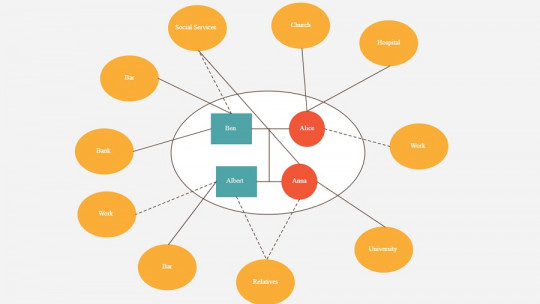
Families are understood as the first environment and space for socialization in our lives. They are complex social systems, in which we take our first steps towards life in society. Depending on our family and the generation of these first attachment bonds, we develop different skills of all kinds; social, instrumental, situational, coping and problem solving…
Generally in the collective imagination, Families are usually understood normatively as systems made up of a mother, a father and children ; generally in our Western culture, two or three. These family ideals do nothing but reinforce false beliefs and cause a lack of representation for all those families that do not correspond to this type of regulations. Where are the single-parent, adoptive or conflict-situated families?
All families experience problems, and no family unit or home is perfect. Even the normatively focused nuclear family of four can be founded on pain and a lack of resources to meet the needs of the family as a system. However, we usually talk about broken families only in the case of families in risk or problematic situations.
Disstructured families are all those that challenge the norm of normative and nuclear structure, and do not necessarily have to be characterized by a lack of proper functioning. In this article, we will break down some specific types of unstructured families, thus deconstructing stigmas and false beliefs and generating fair knowledge for all those people who are part of these family structures far from the norm.
What are broken families?
Unstructured families are a reality that encompasses a diversity of family situations and dynamics that differ from traditional models, linked mainly to the nuclear family of mother, father and children. This term is not intended to be a value judgment, but rather a description of those family units that face particular challenges in their dynamics and functioning. These difficulties can manifest themselves in different ways and in different dimensions of family life.
It is essential to recognize that the notion of “broken family” does not automatically imply that these families are incapable of meeting the emotional or physical needs of their members. Each family is unique, with its own strengths and challenges. The diversity of family structures reflects the complexity of contemporary society, where factors such as cultural, economic and social changes have led to the evolution of new forms of family organization.
Unstructured families should not be understood as carrying a precise or static label ; rather, it is a dynamic concept that can be applied in diverse contexts. The variety of situations that this term encompasses includes everything from families with communication difficulties to those facing deeper crises such as domestic violence, addictions or intergenerational conflicts. When exploring the concept of dysfunctional families, it is crucial to adopt a comprehensive perspective and move away from negative prejudices commonly associated with the word “dysfunctional.”
Deconstructing the “dysfunctional” label
When addressing the topic of broken families, it is essential to unravel the pejorative label of “dysfunctional” that is often associated with these family units. The word “dysfunctional” carries negative connotations and can generate unnecessary stigmatization since it oversimplifies the complexity of family relationships.
The reality is that most families experience challenges at some point in their lives, and these difficulties should not automatically be labeled as signs of dysfunction. Taking a more nuanced perspective means recognizing that families face a wide range of situations, from temporary crises to more persistent challenges. It is relevant to understand that the term “dysfunctional” often does not reflect the resilience and adaptability inherent in many families. By categorizing a family in this way, there is a risk of overlooking its strengths and internal resources that could be mobilized to overcome adversity.
The diversity of family structures and the unique experiences of each member underscore the importance of reevaluating how we label and perceive families. Instead of taking a judgmental approach, we can cultivate a deeper understanding of each family’s specific circumstances and foster a narrative that promotes support and empathy
Types of broken families
Next, we’re going to break down some different types of broken families. Remember that broken families do not have to lead to a lack of functionality or proper attention to education. Furthermore, family systems are very complex and always susceptible to change, so we should not understand them as purely static and unchanging.
1. Families with absent parents
Within the diversity of unstructured families, those with absent parents stand out as a reality that can profoundly impact family dynamics. The physical or emotional absence of one or both parents can arise from various circumstances, such as work commitments, separations or conflicts.
This situation can influence the emotional development of children and the family’s ability to maintain a solid connection Addressing the challenges associated with parental absence requires understanding and support, as remaining members may need additional resources to maintain a healthy and stable family environment.
2. Families in situations of violence
Families who experience violence face devastating challenges. Violence can manifest itself in various ways, including physical, emotional or verbal. These situations not only affect the health and safety of family members, but also create an emotionally tense environment. The complexity of these scenarios often implies the need for professional interventions and support services. Raising awareness about domestic violence is essential to foster safety and well-being, promoting family environments where respect and empathy prevail over violence.
3. Families with addiction problems
Families affected by addiction problems face a complex battle. Substance dependence can create significant tensions, affecting relationships and family stability. Addiction not only impacts the individual directly involved, but also affects loved ones, creating conflicts and emotional challenges. Seeking professional and community psychotherapeutic support is crucial to addressing these issues effectively Fostering understanding and breaking the stigma associated with addiction are essential steps in building an environment where recovery and mutual support can flourish.
4. Families with intergenerational conflicts or traumas
In some broken families, conflicts and traumas can transcend generations, creating patterns that are difficult to break. Past painful experiences, such as abuse or loss, can affect current family dynamics. These patterns can influence relationships, communication, and emotional health. Therapeutic intervention may be essential to address the deep roots of these intergenerational conflicts. By understanding and confronting past wounds, families can work toward healing, promoting healthier, more resilient relationships over time.
5. Families with reversed roles
In some broken families, traditional roles can be reversed, challenging conventional expectations. This It can occur when children assume more parental responsibilities due to various circumstances, such as illness, addictions or parental absences. This reversal of roles can generate tensions and imbalances in family dynamics. It is crucial to approach these situations with understanding and support, recognizing the need to balance family responsibilities. Promoting a more equitable distribution of roles can contribute to a healthier environment and allow for the proper growth and development of each family member.
6. Single-parent families
Single-parent families, headed by a single parent, face unique challenges. The sole responsibility of parenting and financial support can create emotional and financial strain. Despite the extraordinary efforts of many single parents, the lack of support can be overwhelming
It is vital to recognize the strength and resilience of these families, promoting policies and resources that facilitate their well-being. Community and government support can be crucial to ensuring that single-parent families have access to the resources necessary to thrive and provide a stable environment for their children.
7. Families with non-conventional members
Families with unconventional members challenge traditional expectations by including structures that are different from the typical ones. Couples without children, cohabitants without biological ties, or diverse configurations are valid forms of family organization. Although they sometimes face social judgment, these families demonstrate the richness of diversity. Acceptance and understanding of diverse family forms are essential to building an inclusive society
Recognizing and respecting the autonomy of these family units contributes to an environment in which everyone can flourish, regardless of the family structures they choose.
Conclusions
In the diversity of broken families, a multifaceted reality emerges. Deconstructing the label “dysfunctional” reveals the complexity inherent in each family unit. Addressing issues such as violence, addictions, and role reversals requires compassionate approaches and personalized solutions. Recognizing the strength of single-parent families and unconventional structures is essential. By fostering understanding and support, we can build a path to family resilience, promoting environments where every family can thrive.








